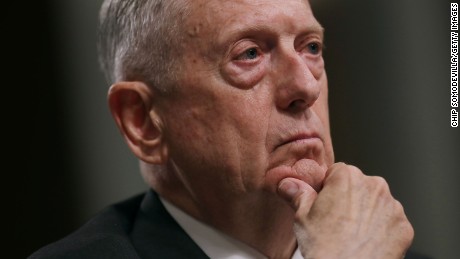Story highlights
- Mattis: "The strategic decisions have not been made"
- McCain said last week the US was "losing" there
Washington (CNN)Defense Secretary James Mattis said Monday that the Trump administration was "very, very close" to finalizing its new strategy in Afghanistan, but warned it had not been settled yet.
"The strategic decisions have not been made," Mattis said.
During comments at the Pentagon press area, Mattis insisted "all options" remained on the table for how to approach Afghanistan, and said those options included a full withdrawal as well as a proposal for the use of more contractors to manage the US effort there.
When asked if President Donald Trump had confidence in Gen. John Nicholson as the top US commander in Afghanistan, Mattis replied, "ask the President," and voiced his own support for the general.
"He is our commander in the field," Mattis said. "He has the confidence of NATO. He has the confidence of Afghanistan. He has the confidence of the United States, and the President again is looking at all aspects of our effort over there as he must in his responsibilities as the commander-in-chief."
Mattis and national security adviser H.R. McMaster have been leading a review of US policy in Afghanistan.
Nearly 16 years after the US led a coalition there to topple the Taliban from power, US-led forces and the new Afghanistan government have struggled to stabilize the country and push back against pressure from militants like the Taliban.
Mattis told the Senate Armed Services Committee in June that he would present a new strategy for the war in July, but the US has yet to articulate a new path forward. The options considered have ranged from a full withdrawal to an increase in US troops there.
As the administration has delayed its decision, outside voices have sought to advocate their own strategies for the war-torn nation.
Last week, Arizona GOP Sen. John McCain offered his strategy on Afghanistan, arguing for more troops in the country for counterterrorism missions as well as increased US airpower, and saying the US was losing there.
And Erik Prince -- who founded Blackwater, a private military company that provoked international outrage after a deadly 2007 shooting in Iraq -- has pressed his own vision for the US to move its Afghanistan strategy largely over to the private sector.
He said the US should appoint a viceroy, a term that recalls colonialism, to manage the nation and deploy military contractors with Afghanistan military brigades over the long term.





